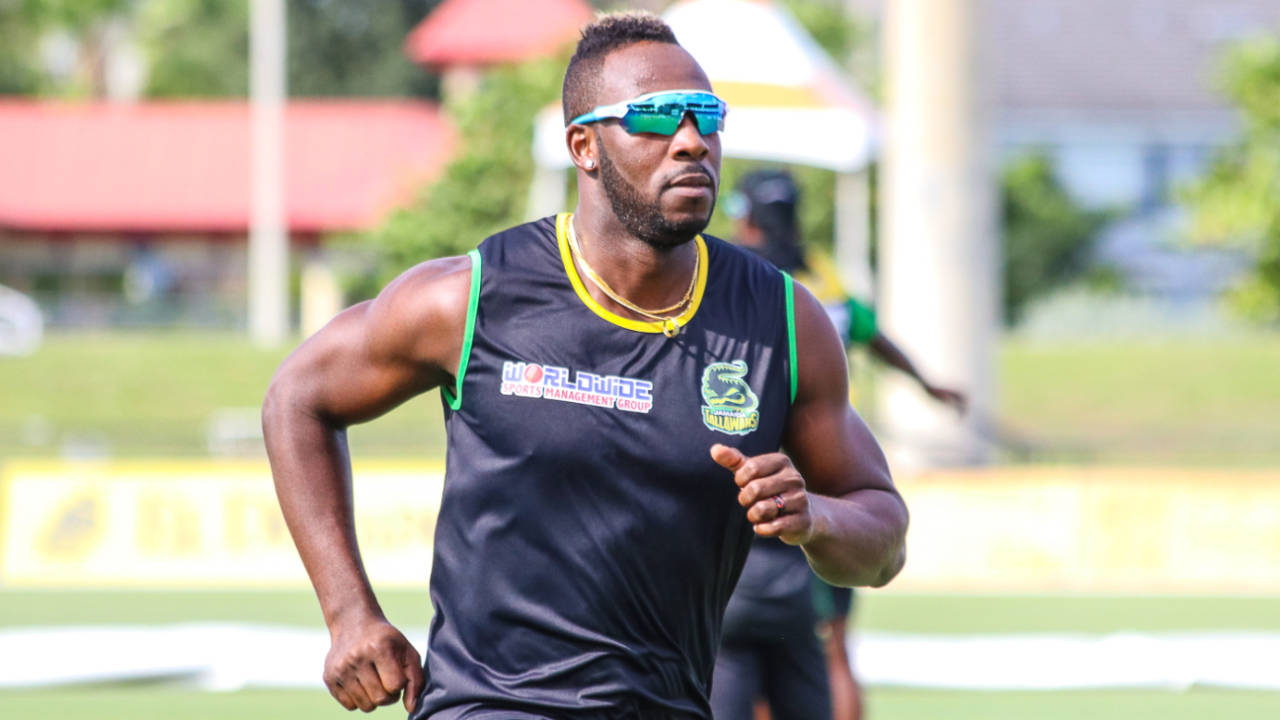Possible Andre Russell return adds to sense of West Indies revival
The West Indies board has done well to repair fractured player relationships and is reaping improved commercial rewards, too
George Dobell in Barbados
19-Feb-2019
Andre Russell goes through his warm-up sprints during team training • Peter Della Penna
It's probably still too early to categorise recent events in Caribbean cricket as a resurgence. Victory over England in a Test series was encouraging, but perhaps the roots of recovery are still too shallow, the growth too fragile to regard it as the new normal. It's too early to know, for sure, whether it was an aberration or a revival. The lack of local people at international games remains a significant worry.
But, for the first time in several years, the good news stories are starting to add up. After the return of Darren Bravo to international cricket, we have Chris Gayle back once again and confirmation that Nicholas Pooran could make his ODI debut in the coming days. A talent that could have been lost to West Indies - at ODI level, anyway - may have a bright future for them yet.
Andre Russell could be added to the squad after the first two ODIs, too. While Russell originally informed CWI that his knee wasn't able to get through 50-over cricket, recent reports suggest it has improved faster than was anticipated. Instead of just adding him to the squad for the T20 matches that follow the ODIs, which was the original plan, there is a possibility he could be selected for the final three ODIs. And while a full ten-over stint may prove beyond him, he could still add value by delivering five or six overs and providing some batting firepower in the middle order.
Whether Kieron Pollard could follow a similar path remains to be seen. He hasn't played an ODI since October 2016 and, now aged 31, may well have been replaced in the selectors' thoughts by the likes of Fabian Allen, Carlos Brathwaite, Rovman Powell and Keemo Paul. But with Darren Bravo and Russell back in the reckoning, perhaps there could still be a way back for Pollard.
Crucially, the policy - borrowed from New Zealand - of allowing Caribbean players to appear in various franchise leagues with the understanding they can, with a little compromise, still be picked for West Indies is working. It has eased a constant source of tension and allows players to earn a decent living without having to make decisions about their international future.
Either way, a World Cup campaign that looked as if it may never happen a few months ago - West Indies missed out on automatic qualification and had to go through another tournament from which they qualified alongside Afghanistan - is suddenly starting to look just a little bit exciting. While West Indies are few peoples' favourites for the trophy, they have batting and bowling firepower that could derail a campaign or two along the way.
News that Colonial Group have been recruited as a sponsor - it is now to be known as the Colonial Medical Insurance ODI Series - may prove quietly significant, too. While talk of commercial deals may be of little interest to many spectators, such things matter.
In this case, it is not so much that a sponsor has been attracted for this particular series; that was always likely to prove marketable. It is more that the deal is with a Caribbean company and includes the regional 50-over competition and various grassroots schemes.
The regional Super50 tournament hasn't had a sponsor for years. And, for a while, most commercial deals in Caribbean cricket have seen rights sold to an Indian agency for a modest fee. That agency would then find a buyer and reap the profits. As a result, many of the sponsorship deals were often aimed at the Indian TV audience. You could understand why some felt CWI didn't much care about its local audience. You could see cricket slipping in public relevance by the year.
While the exact value of this deal remains unclear, it is understood to be worth millions of US dollars - perhaps as much as 5% of the board's annual turnover - and cover a four-year period. As a result, it will significantly boost CWI's ability to sustain its newly expanded professional system - up from something like 30 professional players to 120 in the last couple of years - and pay the international players a competitive rate. Put simply, without such deals, West Indies cricket cannot compete.
It might be unwise to read too much into one deal. In the case of Colonial Group, for example, their vice-president, Marlon Graham, once opened the batting with Gayle for West Indies Under-19s. His personal passion for the game might not be reflective of the entire region.
But this is not a one-off. In recent months, CWI has also announced deals with Betway and Sandals. Companies with some local relevance are starting to want to be associated with a brand that looked tainted not so long ago. Cricket is looking more attractive for spectators and, as a result, is more relevant for commercial partners. Qualifying for the World Cup surely makes such deals easier to agree.
In a perfect world, this could become a virtuous circle. There is a new round of broadcast rights to be negotiated later in the year. If West Indies can do well at the World Cup and in the Test series that follows against India, it could well be rewarded in financial terms. And that, in turn, allows for investment in facilities and grassroots projects that could make life easier for the generation to follow.
So yes, the roots are shallow and the growth is fragile. But there is something here that, with some careful nurturing, could bloom once more.
George Dobell is a senior correspondent at ESPNcricinfo
